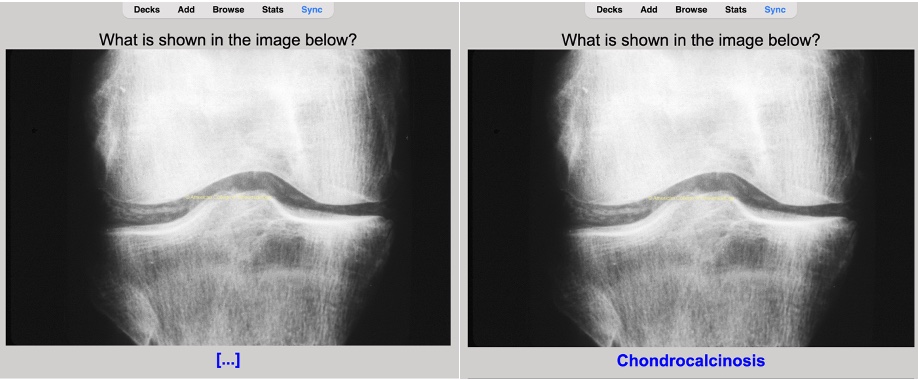Session Information
Session Type: Poster Session C
Session Time: 10:30AM-12:30PM
Background/Purpose: Electronic flashcards (EF) have become a widely used study tool by medical students. One of the most well-known is the spaced repetition program Anki. There are many widely available online decks with thousands of cards that have been crowd sourced. Of the decks available, there is a lack of vetting by experts in the field of rheumatology to confirm the accuracy of the information. The aim of this project is to develop a free and accurate resource to aid medical students in learning relevant teaching points related to adult and pediatric rheumatology.
Methods: A collaborative group of four rheumatologists, one rheumatology fellow, one internal medicine resident, and one medical student was assembled. The decision was made to target United States Medical Licensing Examination (USMLE) Step content with the intention of developing an EF deck for undergraduate medical education. Using a backward design approach questions were developed based on USMLE content outlines. Learning objectives and subsequent testing points were created. These were reviewed by the rheumatologist and rheumatology fellow co-authors for accuracy. A pilot deck of Anki flashcards was created for crystalline arthritis. These were again reviewed. The approved deck is being distributed to medical students to provide quantitative and qualitative feedback.
Results: We identified 12 USMLE organ systems with rheumatology related content, 29 categories within these, 15 subcategories, and subsequent listed conditions were then identified. From these listed conditions, 15 topic condition groups were developed. Through the selection process, crystalline arthritis was selected for a pilot deck. Fifteen learning objectives pertaining to crystalline arthritis were created using Bloom’s taxonomy followed by 50 testing points. After review and feedback by co-authors 55 questions were developed from the testing points. Ranking of the fifteen highest yield questions by team members narrowed this to the 15 most relevant questions. During the development of Anki cards to best fit this format 28 cards were created.
Conclusion: Using backward design to work from content outline topics to objectives to testing points was helpful in guiding the development of a comprehensive yet succinct deck of Anki EFs. Having diverse levels of training in the collaborative group was helpful given the student’s and resident’s experience using Anki cards. Students provided faculty development sessions regarding effective use of Anki EFs. Creation of a deck of EFs by experts in rheumatology was feasible. These cards are being piloted with medical students to obtain both qualitative and quantitative student feedback. Based on feedback from this pilot the goal is to have multi-center implementation of a standardized and broadly applicable deck. Additional future directions include developing a broader range of rheumatology relevant EF decks such as one focused towards internal medicine residents and rheumatology fellows.
 Use of Kern’s Six Step Approach in the Development of Anki Electronic Flashcards for Teaching Preclinical Students Board Relevant Topics
Use of Kern’s Six Step Approach in the Development of Anki Electronic Flashcards for Teaching Preclinical Students Board Relevant Topics
.jpg) Backward Design Process of Content Development
Backward Design Process of Content Development
To cite this abstract in AMA style:
Bellamy M, Stalker G, Nichols L, Strouse J, Gillispie-Taylor M, Scholz B, Kiwalkar S. Developing Rheumatology Specific Anki Electronic Flashcards for Teaching Preclinical Students United States Medical Licensing Examination Board Relevant Topics [abstract]. Arthritis Rheumatol. 2025; 77 (suppl 9). https://acrabstracts.org/abstract/developing-rheumatology-specific-anki-electronic-flashcards-for-teaching-preclinical-students-united-states-medical-licensing-examination-board-relevant-topics/. Accessed .« Back to ACR Convergence 2025
ACR Meeting Abstracts - https://acrabstracts.org/abstract/developing-rheumatology-specific-anki-electronic-flashcards-for-teaching-preclinical-students-united-states-medical-licensing-examination-board-relevant-topics/

.jpg)